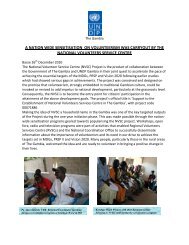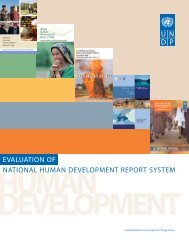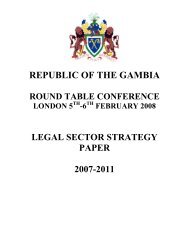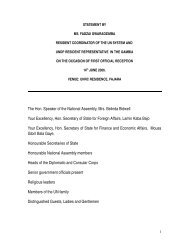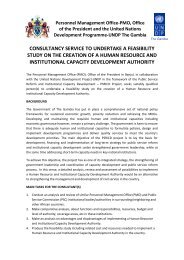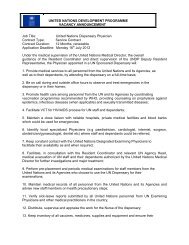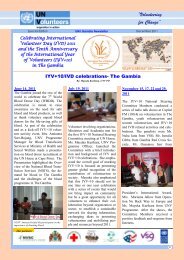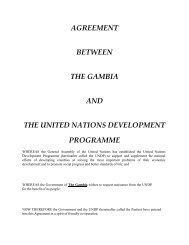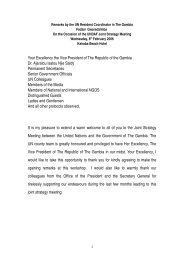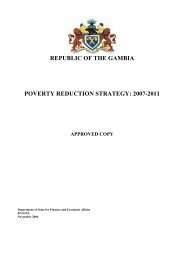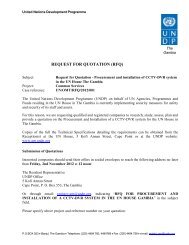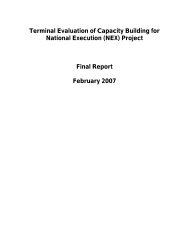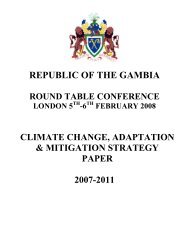Introduction - UNDP The Gambia
Introduction - UNDP The Gambia
Introduction - UNDP The Gambia
You also want an ePaper? Increase the reach of your titles
YUMPU automatically turns print PDFs into web optimized ePapers that Google loves.
________________________________________________________________________________________________________________________<br />
2<br />
Building Human Capacity in the Public<br />
Sector: Challenges and Opportunities for<br />
Achieving the MDGs<br />
CHAPTER PREVIEW<br />
Definition of the Public Sector<br />
<strong>The</strong> Public Sector in the Development Process of African Countries<br />
Development Strategies of Government<br />
<strong>The</strong> Challenges Facing the <strong>Gambia</strong> Public Service<br />
Evaluation of Capacity Building Interventions of Public Sector Programmes<br />
and Projects<br />
– <strong>UNDP</strong>-Economic Management and Capacity Building Project<br />
– World Bank-Capacity Building for Economic Management Project<br />
• Recommended Policy Measures and Strategies for Improving Capacity<br />
Building in the Public Sector<br />
– Lack of Incentives, Motivation and Commitment<br />
– Effective Management of the Training Function<br />
This chapter examines ongoing<br />
interventions in the public sector,<br />
which seek to develop human<br />
capacity, and identifies the challenges and<br />
opportunities to be addressed for the<br />
achievement of the MDGs in <strong>The</strong> <strong>Gambia</strong>. It<br />
is important at the outset to be clear about the<br />
definition of the public sector and the role it<br />
plays in the development efforts of African<br />
countries in general and <strong>The</strong> <strong>Gambia</strong> in<br />
particular.<br />
2.1 Definition of Public Sector<br />
In his book entitled Public Administration<br />
Thornhill defines the public sector as “a<br />
group of institutions having in common some<br />
reliance on the power of the state, from which<br />
they can justify their activities and a political<br />
belief which accords greater merit to<br />
collective rather than to individual<br />
action.” 4 By extension, the public sector is<br />
composed of bodies, which rely for their<br />
existence, or their powers (sometimes both)<br />
on the authority conferred on them by the<br />
state in varying degrees through some formal<br />
process. It is their ability to invoke, in a<br />
greater or lesser degree, the compulsive<br />
power of the state, which brings them within<br />
the public sector.<br />
<strong>The</strong> endowment of state power varies from<br />
one institution to another, but generally three<br />
broad groups are identifiable, namely:<br />
• Governmental Bodies: <strong>The</strong>se exercise<br />
governmental functions that are readily<br />
recognisable, eg ministries (or<br />
departments of state), public agencies,<br />
government departments and local<br />
government authorities. <strong>The</strong>se are clearly<br />
governmental bodies, created to perform<br />
functions directed at the public interest.<br />
• Legislative Bodies: <strong>The</strong>se are bodies such<br />
as state enterprises, boards and<br />
corporations (parastatals) whose<br />
governmental sanction lies in legislation,<br />
which determines their institutional<br />
________________________________________________________________________________________________<br />
Building Capacity for the Attainment of the Millennium Development Goals in <strong>The</strong> <strong>Gambia</strong> National Human Development Report 2005<br />
3



